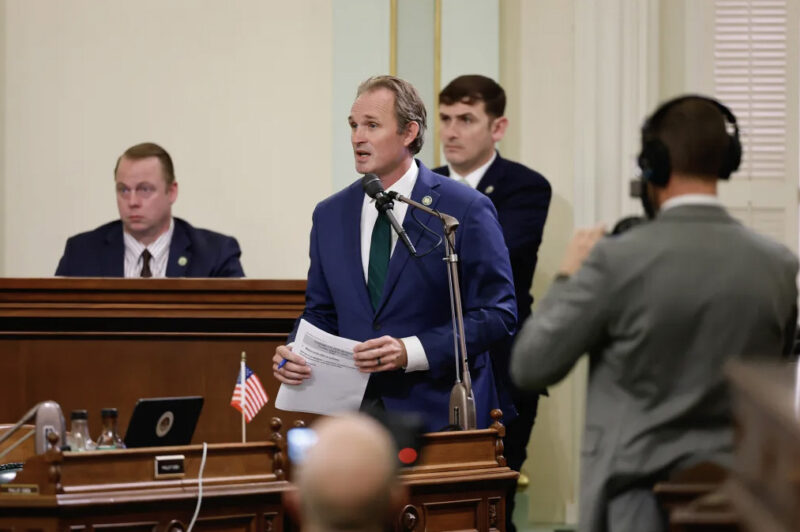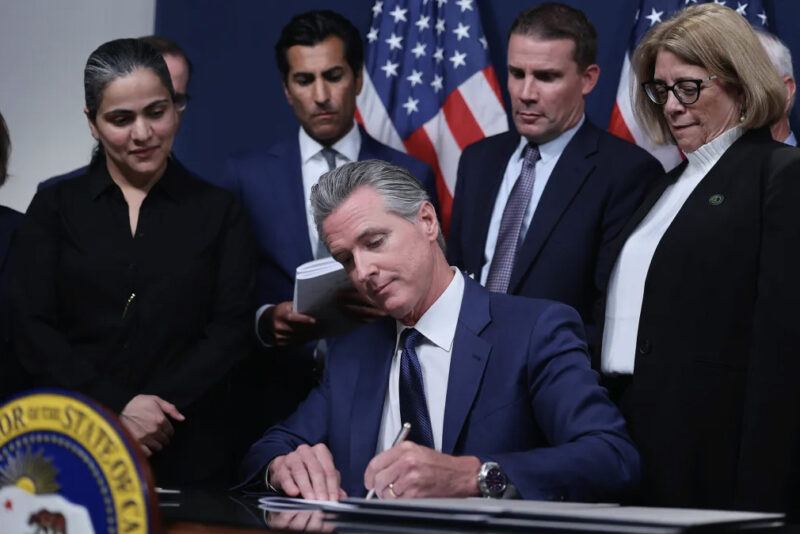By Maya C. Miller and Jeanne Kuang
CalMatters Writers
Gov. Gavin Newsom’s plan to counter President Donald Trump’s election gerrymander in Texas with his own redistricting play in California is on its way to voters.
The California Legislature on Thursday approved his proposal calling for a special election on a ballot measure that would suspend the state’s current congressional districts, which were drawn by an independent commission, and replace them with a map intended to favor Democrats.
The Assembly passed the measure 57-20, and lawmakers on the floor erupted in applause even before they closed the vote. The Senate passed it hours later on a party-line vote, 30-8. Newsom declared a Nov. 4 special election shortly afterward.
At a press conference to promote the upcoming campaign for what will appear on the ballot as Proposition 50, he said it was time for Democrats to “play hardball” in response to the Trump administration’s moves to “advance their power.”
“We tried to hold hands and talk about the way the world should be,” he said. “We can’t just think differently, we have to act differently.”
California voters in a 2010 ballot measure backed independent redistricting for congressional districts, a process meant to cultivate fair, competitive elections. Democrats say they’re reluctant to give up that system, even temporarily, but believe they have to in order to counter Trump’s bid to retain control of Congress after 2026.
“If unaddressed, Texas’ actions – which occur without the vote of the populace – will disenfranchise California,” said Assemblyman Josh Lowenthal, a Long Beach Democrat whose father had pushed for nonpartisan redistricting as a state lawmaker and congressman.
“It’s imperative that Californians have a voice in selecting the political party that controls Congress in 2026,” said Lowenthal in an emotional speech from the floor before the vote. “So today, I proudly join with my father, the architect of this commission, in urging its temporary suspension.”
Republicans before the vote pleaded with their colleagues to resist following Texas in the race to the gerrymandering bottom.
“There’s really only one way to stop – someone has to refrain from striking back, and show a better way,” said Assemblyman James Gallagher, Republican of Chico and the minority leader.
Lawmakers on Thursday also passed a bill containing the new congressional map voters will be asked to approve, sending it to Newsom’s desk, and an additional bill that will facilitate and fund the special election. Newsom signed both of them.
The change is described as temporary; the measure that will go before voters requires the state to return to nonpartisan map-drawing after the 2030 census.
Newsom wanted to counter Texas
Newsom kicked off the special election scramble after Trump declared that he was “entitled” to five more GOP congressional seats in Texas. He demanded that Lone Star State lawmakers shore up Republicans’ razor-thin, three-seat House majority by redrawing their congressional maps mid-decade. When Gov. Greg Abbott indicated Texas would redistrict, Newsom said California would retaliate.
Democrats hold 43 of the state’s 52 congressional seats. The Newsom-backed maps transform five Republican seats into districts that heavily favor Democrats. By ousting those incumbents, Newsom would effectively cancel out Trump’s effort in Texas. The maps also strengthen Democrats’ hold on three other competitive California districts, making it harder for the GOP to flip them next year.
California Republican lawmakers spent the week throwing up a variety of procedural blocks to try to stop the bills’ fast-tracked progress through the Legislature, including by asking the California Supreme Court to weigh in on their challenge to the short time between the legislation’s public release on Monday and their final vote on the Assembly and Senate floors on Thursday.
They demanded an end to the redistricting arms race nationwide, with some willing to condemn Texas and other red states that Trump has urged to redraw their maps.
They argued that Newsom’s maps unfairly split some communities into multiple congressional districts, and that some Democratic lawmakers were biased given their reported personal interest in running for Congress.
In particularly acrimonious spells on the Senate and Assembly floors, the two parties sparred over who had started the fight. Republicans, accused of insufficient opposition to the Trump administration, in turn argued Democratic lawmakers were overly loyal to Newsom.

GOP couldn’t stall measure
But Republican efforts to derail the measure ran up against both political numbers and longtime legislative practice in California.
Polling shows most Democratic voters want the party to do more to fight the Trump administration. In the past few weeks, Democratic lawmakers, who command a three-quarters supermajority in both chambers, have overwhelmingly fallen in line behind Newsom on the redistricting effort.
Every year, lawmakers regularly reveal last-minute deals that they fast-track for passage 72 hours later, in a way that nominally complies with state constitutional requirements.
The timing of the votes may be litigated, but California Republicans have already lost in court once. The state Supreme Court on Wednesday night declined to take up the GOP’s timing-based challenge to the map-drawing effort.
GOP lawmakers acknowledged they’ll likely have to fight the issue at the polls.
“We will defeat this, if it’s not here in the Capitol, it will be in a courtroom or it will be at the ballot box,” Assemblywoman Alexandra Macedo said this week.









